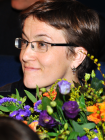
prof. dr. A.P. (Alexandra/Sasha) Zhernakova

I joined the Department of Genetics at the UMCG, University of Groningen in January 2012, supported by a Rosalind Franklin Fellowship (a tenure-track position). My work initially focused on analysing genetic predispositions to immune-related diseases and gastrointestinal function, as well as investigating biological aging (telomere length, age-related gene expression, and other factors) in immune and metabolic diseases.
In 2013, I initiated a new research line on the role of the microbiome in health and disease. In collaboration with Lifelines, we profiled over 10,000 participants for their gut microbiome composition and identified numerous links between gut microbes and individual health. We also established connections with several clinical groups in UMCG and outside, investigating the microbiome in relation to cardiovascular diseases, gastrointestinal conditions, and metabolic diseases. This effort led to the establishment of the Groningen Microbiome Hub, a multidisciplinary community of more than 30 researchers focused on various aspects of microbiome studies.
Key publications describing the Lifelines microbiome research include Zhernakova et al, Science 2016 and Gacesa et al, Nature 2022. For the first time we established the massive effect of common drugs on the gut microbiome, in particular proton pump inhibitors and other drugs. Multi-omics analyses identified relations between gut microbiome and human proteomics, metabolomics, antibody repertoire, and diseases (cardiovascular disease and gastrointestinal diseases). Using longitudinal microbiome data from Lifelines participants, we developed the microbial individual-specific fingerprinting. Following the analysis of the effect of human genetic variants on the gut microbiome in Lifelines cohort (Bonder et al, Nature Genetics 2016; Lopera-Maya et al, Nature Genetics 2022), I established and lead the international MiBioGen consortium, focused on the identification of links between host genetics and the gut microbiome.
Ongoing microbiome research in Lifelines and adult clinical cohorts includes:
· Analysis of the gut microbiome in relation to a broad range of environmental factors, metabolism and health, funded by the NWO-Gravitation grant ExposomeNL.
· Investigation of the links between the gut and soil microbiomes, funded by the NWO-KIC grant.
· Study of the microbiome and immune responses in immune and inflammatory diseases, with a particular focus on chronic fatigue syndrome (ME/CFS), funded by the Horizon 2020 grant Dark Matter and the ZonMW grant ME/CFS-Lines.
Currently, the primary focus of my research is the pregnancy and early-life factors that influence infant development and health. In 2016, we initiated the Lifelines-NEXT cohort, a 4th generation of Lifelines, which I am currently leading. The specific focus of Lifelines-NEXT is on the analysis of the role of microbiome in health. We profile the composition of the gut, vaginal, breast milk and oral microbiome and link them with detailed questionnaires on environment and health in babies and parents. We also investigate immune and metabolic changes during pregnancy and early life using wide-scale proteomics, metabolomics and antibodies measurements. The first papers from this research focused on gut microbiome (Sinha et al, submitted) and virome transmission and development. In addition, we established the CSBabyBiome cohort to investigate the effect of interpartum antibiotic intervention on babies gut microbiome.
Several ongoing research lines in Lifelines-NEXT, including analysis of gut virome, breast milk composition, immune development of babies, their gut and oral microbiome, are ongoing and supported by my personal grants (ERC Starting Grant, NWO VIDI and VICI) and consortium projects (NWO-Gravitation consortium ExposomeNL and Horizon 2020 INITIALISE consortium).
| Last modified: | 08 February 2025 10.43 a.m. |
